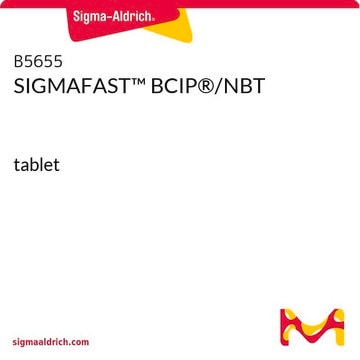11681451001
Roche
NBT/BCIP Stock Solution
Synonym(s):
5-bromo-4-chloro-3-indoyl phosphate, BCIP
Sign Into View Organizational & Contract Pricing
All Photos(1)
About This Item
UNSPSC Code:
12352204
Recommended Products
form
solution
Quality Level
mol wt
817.7
packaging
pkg of 8 mL
manufacturer/tradename
Roche
storage temp.
2-8°C
General description
The reaction product has a blue color and is insoluble in water. The blue color can be visually seen.
Formulas: NBT: C40H30Cl2N10O6, BCIP: C8H6NO4BrClP x C7H9N
Evaluation: visually
Formulas: NBT: C40H30Cl2N10O6, BCIP: C8H6NO4BrClP x C7H9N
Evaluation: visually
Application
- The solution is used for the sensitive detection of alkaline phosphatase (AP) in blotting protocols, including: Southern blot
- Northern blot
- Western blot
- Colony and plaque lifts
- In situ hybridization
- and for applications in immunohistochemistry and immunocytochemistry.
Physical form
Solution of 18.75 mg/ml nitro blue tetrazolium chloride and 9.4 mg/ml 5-bromo-4-chloro-3-indolyl-phosphate, toluidine-salt in 67% (DMSO) (v/v).
Note: The color of the solution can vary from yellowish to light brown.
Note: The color of the solution can vary from yellowish to light brown.
Preparation Note
Working solution: Preparation of staining solution
Always prepare this solution fresh shortly before use.
Always prepare this solution fresh shortly before use.
- For all applications except DIG System: Add 200 μl of the stock solution to 10 ml 0.1 M Tris-HCl, pH 9.5 (20 °C), 0.1 M NaCl, 0.05 M MgCl2.
- For DIG System applications: Add 200 μl of the stock solution to 10 ml 0.1 M Tris-HCl, pH 9.5 (20 °C), 0.1 M NaCl
Other Notes
For life science research only. Not for use in diagnostic procedures.
Storage Class Code
12 - Non Combustible Liquids
WGK
WGK 1
Flash Point(F)
does not flash
Flash Point(C)
does not flash
Certificates of Analysis (COA)
Search for Certificates of Analysis (COA) by entering the products Lot/Batch Number. Lot and Batch Numbers can be found on a product’s label following the words ‘Lot’ or ‘Batch’.
Already Own This Product?
Find documentation for the products that you have recently purchased in the Document Library.
Customers Also Viewed
Jaroslav Fabik et al.
Biology open, 9(6) (2020-07-04)
Cranial neural crest cells (cNCCs) originate in the anterior neural tube and populate pharyngeal arches in which they contribute to formation of bone and cartilage. This cell population also provides molecular signals for the development of tissues of non-neural crest
João L Q Durigan et al.
Muscle & nerve, 49(1), 120-128 (2013-04-30)
Neuromuscular electrical stimulation (NMES) is used to improve quadriceps mass after anterior cruciate ligament (ACL) injury. We studied the effect of NMES on mRNA levels of atrophy genes in the quadriceps muscle of rats after ACL transection. mRNA levels of
Garth R Ilsley et al.
Scientific reports, 10(1), 4961-4961 (2020-03-20)
Single-cell RNA-seq has been established as a reliable and accessible technique enabling new types of analyses, such as identifying cell types and studying spatial and temporal gene expression variation and change at single-cell resolution. Recently, single-cell RNA-seq has been applied
Morgan Haugen et al.
Cold Spring Harbor protocols, 2010(10), pdb-pdb (2010-10-05)
Blood-feeding mosquitoes, including the dengue and yellow fever vector Aedes aegypti, transmit many of the world's deadliest diseases. Such diseases have resurged in developing countries and pose clear threats for epidemic outbreaks in developed countries. Recent mosquito genome projects have
Masoud Nasri et al.
Haematologica, 105(3), 598-609 (2019-06-30)
A Autosomal-dominant ELANE mutations are the most common cause of severe congenital neutropenia. Although the majority of congenital neutropenia patients respond to daily granulocyte colony stimulating factor, approximately 15 % do not respond to this cytokine at doses up to
Protocols
Our team of scientists has experience in all areas of research including Life Science, Material Science, Chemical Synthesis, Chromatography, Analytical and many others.
Contact Technical Service












